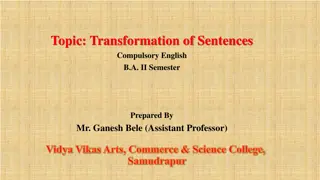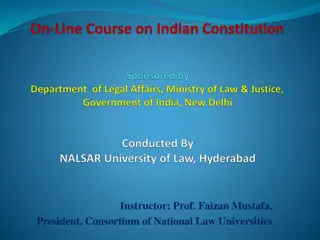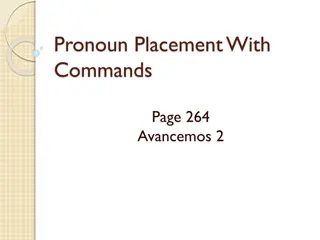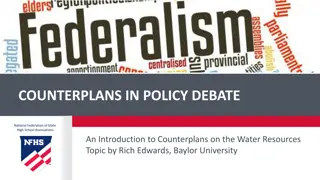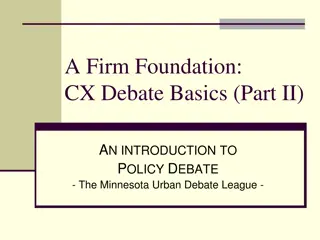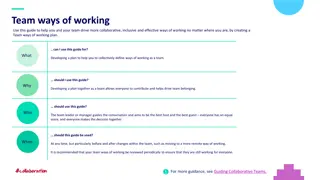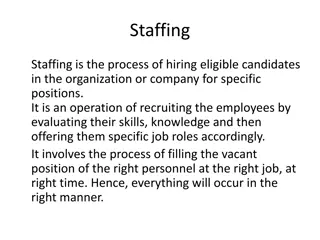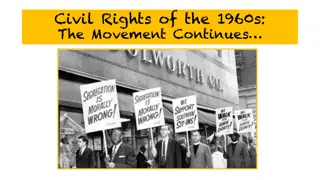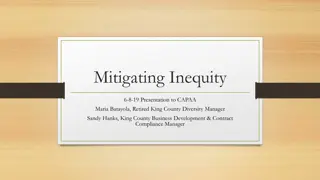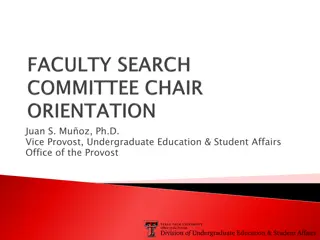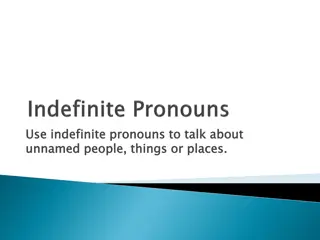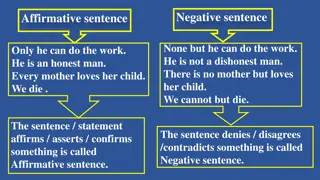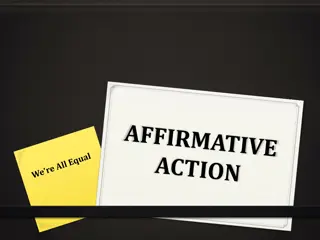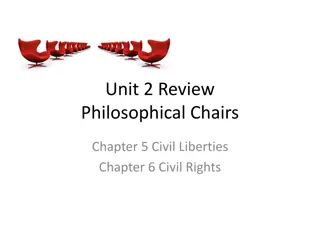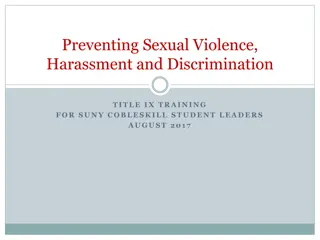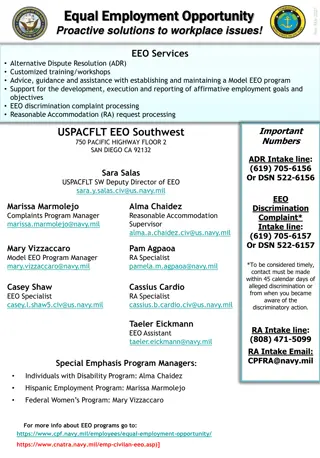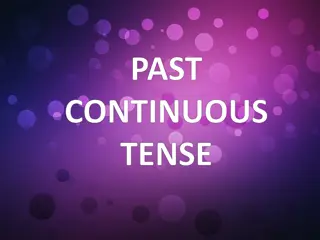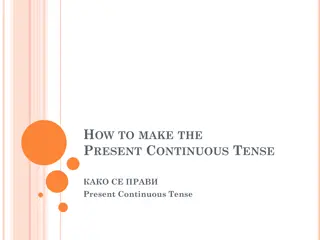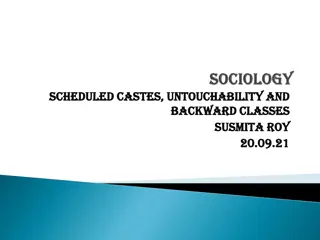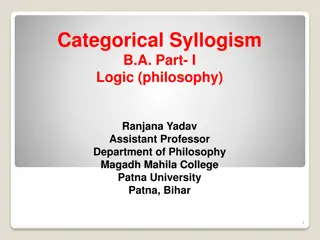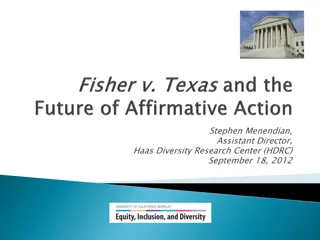Empowering Immigrant Communities: The MICA Project Overview
The Migrant & Immigrant Community Action (MICA) Project, founded in 2011, provides low-cost immigration legal services in the St. Louis and Illinois region. With a vision of creating a safe and welcoming community for immigrants, MICA offers a range of legal services including affirmative asylum, U-
0 views • 14 slides
Sentence Transformation Guidelines and Exercises for B.A. II Semester English
Understand the concept of sentence transformation to alter sentence forms without changing meanings. Learn various types of transformations like affirmative to negative, interrogative to assertive, and more. Practice exercises provided for hands-on learning.
1 views • 11 slides
Team building companies near me
Looking to foster unity and enhance productivity within your organization? Explore team-building companies near you to cultivate a cohesive workforce. With tailored activities and expert facilitation, these companies specialize in strengthening bonds, improving communication, and fostering collabora
1 views • 7 slides
Understanding Present vs. Past Tenses in English Grammar
Exploring the basics of present and past tenses in English grammar, covering affirmative, negative, and interrogative structures, as well as adverbs of frequency and quantity. Learn about describing general facts, habitual actions, and specific past events through detailed examples and visual aids.
8 views • 13 slides
English Transformation Rules: Assertive to Interrogative with Examples
Learn the rules of transforming assertive sentences into interrogative sentences in English grammar. Understand the different scenarios and examples for the transformation process. Enhance your skills in using interrogative sentences in various situations while maintaining the original meaning. Dive
1 views • 23 slides
Understanding the Importance of Immunity in Reporting Laws
Immunity in reporting laws is a critical harm reduction measure that allows sex workers, trafficking survivors, and certain crime witnesses to report incidents to police without facing arrest or charges. By providing immunity, advocates aim to mitigate the harms of anti-prostitution laws, facilitate
0 views • 6 slides
Understanding Our Constitution: Course Details and Syllabus
Enhance your understanding of the Constitution with this course led by Prof. Faizan Mustafa, President of CNU. Discover the importance of constitutional knowledge, eligibility criteria, course duration, fees, and examination details. Delve into the syllabus covering topics like citizenship, rights,
2 views • 17 slides
Pronoun Placement with Commands in English and Spanish
Understanding pronoun placement in commands is crucial in both English and Spanish. In English, pronouns are placed after the verb in both affirmative and negative commands. However, in Spanish, affirmatives attach pronouns while negatives place them in front of the verb. Examples and accent rules a
1 views • 5 slides
Pronoun Placement Rules in Spanish Sentences
Clear up confusion around the placement of reflexive, direct object, and indirect object pronouns in Spanish sentences and commands. Learn the placement rules for different types of pronouns in statements and commands, including examples for single-verb and two-verb sentences. Understand the order o
2 views • 10 slides
Understanding Counterplans in Policy Debate
Counterplans in policy debate are alternative policies presented by the negative team that compete with the affirmative plan. They must be specific, competitive, and mutually exclusive to offer net benefits over the affirmative proposal. Nontopicality and competitiveness are debated aspects, with co
0 views • 10 slides
Understanding Policy Debate Basics: Topicality, Presumption, and Case Construction
Explore the nuances of policy debate focusing on topicality, presumption, and case construction. Learn how debaters analyze the resolution, argue definitions, and use standards to ensure fairness in debates. Dive into the essential components of the First Affirmative Constructive (1AC) and how obser
0 views • 18 slides
Collaborative Teamwork Guide for Effective Ways of Working
Utilize the Team Ways of Working guide to enhance collaboration, inclusivity, and effectiveness within your team, whether working in-person or remotely. Develop a team plan together, led by the team leader or manager, to ensure equal participation and drive team belonging. Consider virtual ways of w
2 views • 6 slides
Understanding the Importance of Staffing in Organizational Success
Staffing is a critical process in organizations that involves hiring eligible candidates for specific positions, ensuring the right people are in the right roles at the right time. It encompasses manpower planning, recruitment, selection, training, and employee welfare, ultimately contributing to ac
0 views • 20 slides
Understanding Simple Past Tense in English Grammar
Explore the usage of simple past tense through examples, irregular verbs, and regular verb forms. Learn how to form affirmative, negative, and question sentences in the past. Enhance your understanding of past actions and events with clear explanations and practice exercises.
1 views • 19 slides
Mastering Tag Questions in English Grammar
Learn how to effectively construct and use tag questions in English grammar through four basic rules: ensuring same tense, using negative tags for affirmative sentences and vice versa, always including a pronoun, and using contracted forms of helping verbs in negative tags. Examples provided for bet
0 views • 25 slides
Civil Rights Movement of the 1960s: A Historic Journey
The Civil Rights Movement of the 1960s was a pivotal time in American history marked by significant events such as the Freedom Riders, University of Mississippi integration, Birmingham Campaign, March on Washington, Freedom Summer, Civil Rights Act of 1964, Selma to Montgomery March, and the emergen
0 views • 12 slides
Addressing Inequity Through Legislation and Action
Explore the historical pursuit of equity in the United States, from constitutional provisions to civil rights legislation. Delve into the impact of equity laws, employment tools, and affirmative action on mitigating inequity, with a focus on promoting non-discrimination and fostering diversity and i
0 views • 13 slides
University Faculty Search and Affirmative Action Overview
This content discusses the paramount characteristics for conducting faculty searches, including consistency, transparency, and equity. It emphasizes the importance of diversity and underrepresented minorities in the recruitment process, as mandated by Affirmative Action policies. Failure to meet Aff
0 views • 16 slides
Understanding Indefinite Pronouns in English
In English grammar, indefinite pronouns are used to refer to unnamed people, things, or places. They can be affirmative, negative, or used in questions. Examples like "some," "any," and their variations are common in everyday conversations. Learn how to use them correctly to convey the intended mean
0 views • 8 slides
Understanding the Usage of "Some" and "Any" in English Grammar
Learn the differences between using "some" and "any" in English sentences through examples and exercises. Discover when to utilize "some" for affirmative sentences and "any" for questions and negative sentences. Practice with provided exercises to enhance your grammar skills.
0 views • 7 slides
Simple Present Tense: Usage, Formation, and Spelling Rules
Explore the Simple Present Tense through daily routines, affirmative statements, formation rules for different pronouns, spelling guidelines for adding final -s, and forming interrogative sentences. Understand how to express habits, truths, and routines in English using clear examples and explanatio
0 views • 12 slides
Understanding Affirmative and Negative Sentences Structures
Exploring the structure of affirmative and negative sentences through various examples involving the use of words like "only," "none but," and "nothing but." Learn how these constructions highlight affirmations or denials in English grammar.
0 views • 5 slides
Understanding Affirmative Action: Origins and Criticisms
Affirmative Action was first proposed in the US by President John F. Kennedy in 1961 to combat discrimination. It aimed to prevent discrimination based on race, color, religion, sex, and national origin. This policy evolved into two forms: Strong Affirmative Action, which involves preferential treat
0 views • 39 slides
Understanding English Tenses: Simple Present and Sentence Structure
Explore the Simple Present tense in English, learn how to form affirmative, negative, and question sentences, understand signal words, and discover the usage of long forms and contracted forms. Enhance your knowledge of using affirmatives, pronouns, modals, and sentence structures in English. Improv
0 views • 8 slides
Understanding the Present Perfect Simple Tense
Learn about the usage of the Present Perfect Simple tense, including affirmative, negative, and question forms, time expressions, and practice exercises to enhance your understanding of this important aspect of English grammar.
0 views • 7 slides
Exploring Key Constitutional Debates: Civil Liberties, Civil Rights, and More
Explore vital topics such as the 1st Amendment, search and seizure laws, due process, gender equality, reproductive rights, affirmative action, and beyond. Engage in debates surrounding these critical issues and delve into landmark legal cases that have shaped American society.
0 views • 9 slides
Evolution of Affirmative Action Policies in College Admission in China
The historical development of affirmative action policies in college admissions in China is traced from the Republic Era to contemporary times. The policies have evolved from preferential treatment based on certain backgrounds to programs benefiting ethnic minorities and residents in underdeveloped
0 views • 20 slides
English Lesson on Transformation of Sentences: From Affirmative to Negative
This English lesson conducted by Md. Jamal Hossain covers the transformation of sentences from affirmative to negative for Class Nine students. The lesson focuses on key learning outcomes such as changing sentences, speaking, reading, and writing. Examples and exercises are provided to help students
0 views • 9 slides
Preventing Sexual Violence & Harassment: Title IX Training for SUNY Cobleskill Student Leaders
Student leaders at SUNY Cobleskill underwent Title IX training in August 2017 to understand the law, the college's obligations, and their role in preventing sexual violence and harassment. Governor Cuomo's orders and legislation mandated affirmative consent policies to combat sexual assault on colle
0 views • 36 slides
Comprehensive Equal Employment Opportunity (EEO) Support and Information
Proactive solutions for workplace issues, EEO services, alternative dispute resolution, discrimination complaint processing, reasonable accommodation requests, and support for affirmative employment goals. Learn about federal anti-discrimination laws, legally protected EEO bases, and how to file a c
0 views • 7 slides
Understanding Simple Present Tense with Examples and Formation
Simple Present Tense is used to talk about actions that happen regularly or are true in the present. This tense is used for statements of fact, daily habits, schedules, opinions, and more. The formation includes affirmative, interrogative, and negative sentences. Examples and usage scenarios help in
0 views • 14 slides
Understanding the Past Continuous Tense
The Past Continuous Tense is used to describe interrupted activities that continued for a period in the past or things happening continuously in the past. Learn how to form affirmative, interrogative, and negative sentences in this tense with examples and images.
0 views • 12 slides
Understanding the Present Continuous Tense
Explore how to form the Present Continuous Tense using the present simple of 'be.' Learn how to create affirmative, negative, and interrogative forms, including 'wh-' questions. Discover the spelling rules for verbs ending in 'e,' short one-syllable verbs, and those ending in 'ie.'
0 views • 17 slides
Understanding Scheduled Castes, Untouchability, and Backward Classes in India
The Scheduled Castes (SCs) and Scheduled Tribes (STs) in India are officially recognized groups, representing about 16.6% and 8.6% of the population respectively. They were historically known as Depressed Classes and have been given reservation status for political representation. The government has
0 views • 20 slides
An Overview of Debate: Propositions, Teams, and Formats
Debate is a regulated discussion between two matched sides discussing a proposition, with the affirmative arguing for change and the negative defending the status quo. The standard debate format involves constructive arguments followed by rebuttals from both sides. The roles in a debate include the
0 views • 47 slides
Learn the Present Simple Tense: Affirmative, Negative, and Question Forms
Explore the Present Simple Tense with examples of affirmative, negative, and question forms in English. Master usage through practical sentences and improve your language skills effectively.
0 views • 9 slides
Team Name Team - Meet the Dynamic Members
Discover the talented individuals who make up the Team Name Team, including the Team Manager, Senior Team members, ST Team Captain, and Student Team members. Get insights into their roles and expertise through captivating images showcasing their dedication and teamwork.
0 views • 13 slides
Understanding Categorical Syllogism in Logic: A Comprehensive Overview
Categorical syllogism, a form of inference with two premises and a conclusion, is a fundamental concept in logic. This type of deductive argument consists of three categorical propositions - universal affirmative, universal negative, particular affirmative, and particular negative. Terms such as maj
0 views • 16 slides
Understanding the Team Structure of the Colorado School Support Initiative
The Colorado School Support Initiative (CSSI) involves a team of qualified professionals who conduct school visits and reviews to support charter schools. Team members have specific requirements including depth of knowledge, experience in Colorado schools, and strong communication skills. The CSSI t
0 views • 9 slides
Affirmative Action and Race-Conscious Admissions: The Fisher v. Texas Case
The content discusses the Fisher v. Texas case, where Abigail Fisher, a white female, was denied admission to the University of Texas and challenged the use of race in admissions. It explores the 10% law, holistic admissions, and the debate surrounding affirmative action policies. The demographic br
0 views • 44 slides

